Earlier this year, Washington, D.C., approved what was then the most ambitious climate bill in the nation, requiring utility providers to switch to 100 percent renewable energy by 2032. Boston, meanwhile, continued pushing its stringent energy-disclosure ordinance, which since 2013 has required owners of larger buildings to benchmark and report their utility data. The initiatives helped earn both cities top spots in the 2019 Clean Energy Scorecard, released by the nonprofit American Council for an Energy-Efficient Economy (ACEEE). D.C. came fifth, while Boston held on to its number-one place from 2017, when the previous report came out, according to citylab.com
ACEEE found that overall, the United States is stepping up efforts in advancing renewable energy and energy efficiency, with more than 200 related actions taken by 75 cities. The bad news: Most of those cities have not made significant progress toward their climate goals.
All in all, 48 cities have set goals to reduce greenhouse-gas emissions, and of those, only 11 are actually on track to meeting those goals, according to the report. And a whopping 21 cities—including Detroit, Nashville, and Indianapolis—lack sufficient data to track their progress.
